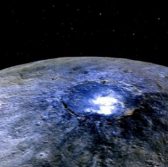 Intel has hosted a concluding event for a two-month study that focused on dealing with challenges in space science and exploration missions using artificial intelligence.
Intel has hosted a concluding event for a two-month study that focused on dealing with challenges in space science and exploration missions using artificial intelligence.
The technology company said Thursday the NASA Frontier Development Lab Event Horizon 2018: AI+Space Challenge Review Event wrapped up FDL’s research program, which involved adopting AI to predict solar activity, map lunar poles and provide a three-dimensional picture of potentially hazardous asteroids.
Study participants were able to develop algorithms that allow lunar rovers to operate autonomously to complete a mission, as well as help NASA engineers pinpoint a lunar rover using combined orbital maps and surface perspective imagery.
Amir Khosrowshahi, vice president and chief technology officer of Intel’s artificial intelligence products group, said that AI will potentially affect future space operations, as well as power data analytics systems.
FDL will release the research and algorithms to the AI and space communities to address future challenges in space operations.




